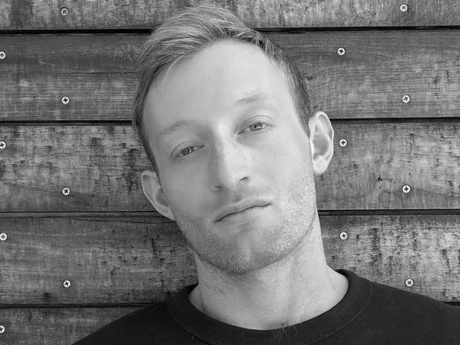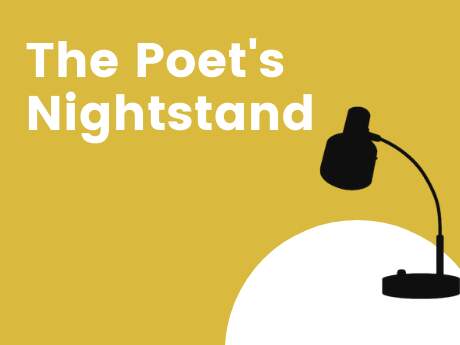The Poet’s Nightstand
The Poet’s Nightstand with Noah Warren
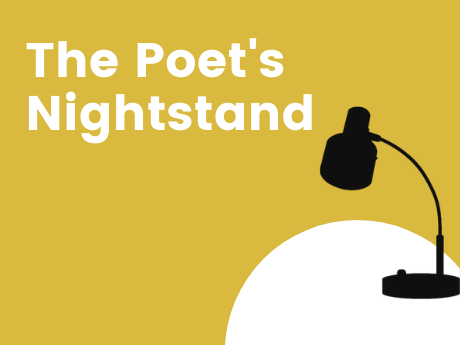
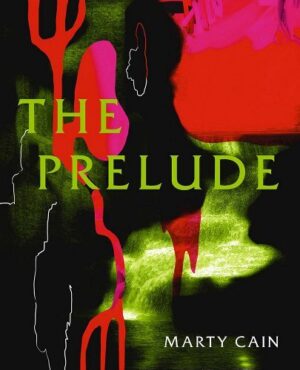
The Prelude
Marty Cain
Bodies split open and become fractals you’ve got to live in: “the gored-open moose becomes a prismatic language.” Or Cain traces Drano through “the Subgarden,” a way of thinking which may be the hero of this volume, sometimes an ecosystem and sometimes a demigod, like a plant-y undercommons. We piece apart the hairball fished from the drains, separating it into bedraggled lines in the bathroom tile, how’s that for an ars poetica. Wordsworth’s brain? Sliced up, made into a “liverwurst sandwich.” The page? unkempt and ornery, a wild thinking system where poems sprawl grossly into each other. Our fingertips split and bleeding, we crawl behind the waterfall into “the green room.” We observe, bitterly, The Law. We trace the insidious operations of “The Menace” which I think means capitalism. What counts as a breath, a resting place, in the restless meaning making of this squishy epic are, maybe, the cryptic visual diagrams of cathedral parts, labeled “endowment,” “endowment,” “Oedipus.” Cain tells me “Romanticism is // learning to see is learning to follow” and “Literary form is…an Inclosure Act of my conscious talons, a ludicrous sadness,” and while I’m in the Subgarden I believe this utterly. I’m not going to bring in the sloppy frames, posthuman, ecocrit, ANT, because the book is smarter than that. It knows bodies are as temporary and recombinable as words, knows community—a word that lassos in dirt and thinking, animals, water, babies—is where desire, action, and resistance begin and end.
Purchase

Fog and Smoke
Katie Peterson
Two impossible temporalities bleed into each other in Fog and Smoke: we move from the eerie structurelessness of pandemic domesticity to the always-arriving catastrophe of fire season in Northern California. And amid all this peril: sharp revelation and the recurrent beauty of care, in, and for, language. I could spend a season feeling toward the metaphysics of the opening sequence, “Fog.” Stuck at home, the poem still keeps turning outward, asking questions of the clouds. Listen: “It’s like God—it disappears. / It wants us to see ourselves. / Its absence is clear.” Taciturn and razory as Dickinson, you can feel the buoyant playfulness of this linework; casually, in a plainspoken Western idiom, the poem layers ambiguities, courts the mysteries of its negative theology. There’s no bravura here, just the mastery and freedom that comes out of long looking, long thought. This is a book precise and local enough to broach the big questions—about the passage of time, about motherhood, about how a family remakes itself day-to-day, about what making is worth—in narrative frames whose slips make each moment a half-surprise, a revelation of what was already there. In a tessellated Platonic nocturne, that ends, miraculously, cheekily, with marriage, Peterson marvels: “We could just become shapes / on a night like this, we could walk / into space and become clouds.”
Purchase
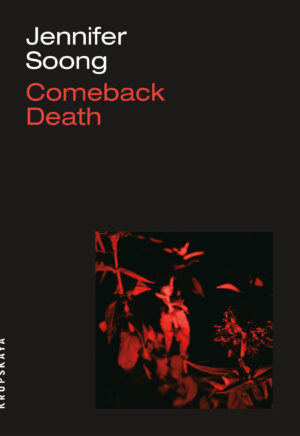
Comeback Death
Jennifer Soong
Soong’s newest collection stages, in a confident slow-motion, the mutability of voice against the constancy of thinking. In three deliberately paced sections, we hear Soong reaching out first toward Sappho (via HD and Anne Carson); then to Hejinian and Scalapino; finally toward Ingeborg Bachmann. Despite the wonderful flexibility of the tone, the immutables of identity carry strikingly, keeping the book tight. Identity lies in instincts of pacing, in enjambment, in a taste for the evasions of candor. Take this from the Sappho section: “I, too, am sorry for the way things passed. / many nights spent worrying what death / would take from me and whom.” The masks here are many, and telling: I can hear the retranslated stiffness of “the way things passed” failing to sanitize the raw emotion of an expected scenario. We are drawn in by the direct confession but kept at a ghostly distance by the history clinging to these words like mist, by the refusal of reference. Such incorporeal confessions, which recur in different forms (“whilst words are in rotation / shapelessly I require a body”) are linked to an existence between countries as to the narrow codes through which the West parses Chinese identity. To arrive, after the chastening of such precise alienations, at the increasingly tender tones, and the much more physical world that the third section builds, is to experience the loss and relief of landing after a long flight.
Purchase
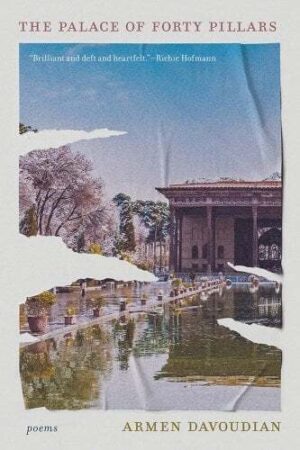
The Palace of Forty Pillars
Armen Davoudian
Impossible not to marvel at the strictness and subtlety of form’s work in Davoudian’s first collection. Sonnet sequences frame this tight but adventurous volume, and the sonnet’s irregular forward motion—folding back with the recursions of rhyme and always tilting uneasily toward final syntheses—models the book’s lurches forward, its near-nostalgias for historical and poetic pasts. There’s a great tenderness for the sensuous particulars of an Iranian childhood, the saffron and the cucumbers, even as the book looks, clear-eyed, at the deprivations and unfreedoms of the Islamic Republic, which are mirrored in the long present tense of Trump’s America. Davoudian’s adroitness in form and line makes simultaneously visible, via prosody, rhyme, and muscle memory, the poetic inheritances that guide it, and the strict laws that emerge from that inheritance. Quietly alluding, or chafing against regularity, these lyrics reminds us how entailed and contingent our own apparent freedoms are. Despite this—that is, because of this—this book can be all the more frank in its cultivation of sensuousness, of beauty. The Palace of Forty Pillars waits, like the soul inside the body, for “a stranger’s / hand to pull the silver from its throat.”
Purchase

Octobers
Sahar Muradi
Unreconciled binaries haunt the weft of Octobers. I was driven to Muradi’s book by the mysterious, indicting “Mariposa,” which, flayed on the page in two Herbert-esque wings, asks us with great perspicacity to read in Monarch-orange a system of migration, poison, incarceration, and invisibility. Our only clue to the poem’s grounding referent (Guantanamo) is a passing mention of Cuba, amid the carefully coded commentary on transformation and bare life. This kind of tender and humane investigation of the linguistic artifacts of two decades of the War on Terror (born in Afghanistan, Muradi lives in New York) characterizes the collection, as does a refusal to synthesize irreconcilably divided identities, languages, worldviews. Landing in poems of motherhood, the book finds a source of hope and new questions: Which languages will be lost to the next generation, and what wounds can’t we help but pass on. Reflecting the formal choices the book has refused, a community coalesces around watching and listening as the infant “builds by repetition. / Reinforces by rhyme” an elemental syntax of stars. Still, the book is too wise to end there, and sends us back into our lives on a monitory note. We catch ourselves in the slips of linguistic exile: “Eyes. Tongue. Yemen,” and then, a few breaths later, “The point was to startle me into my existence”
Purchase

